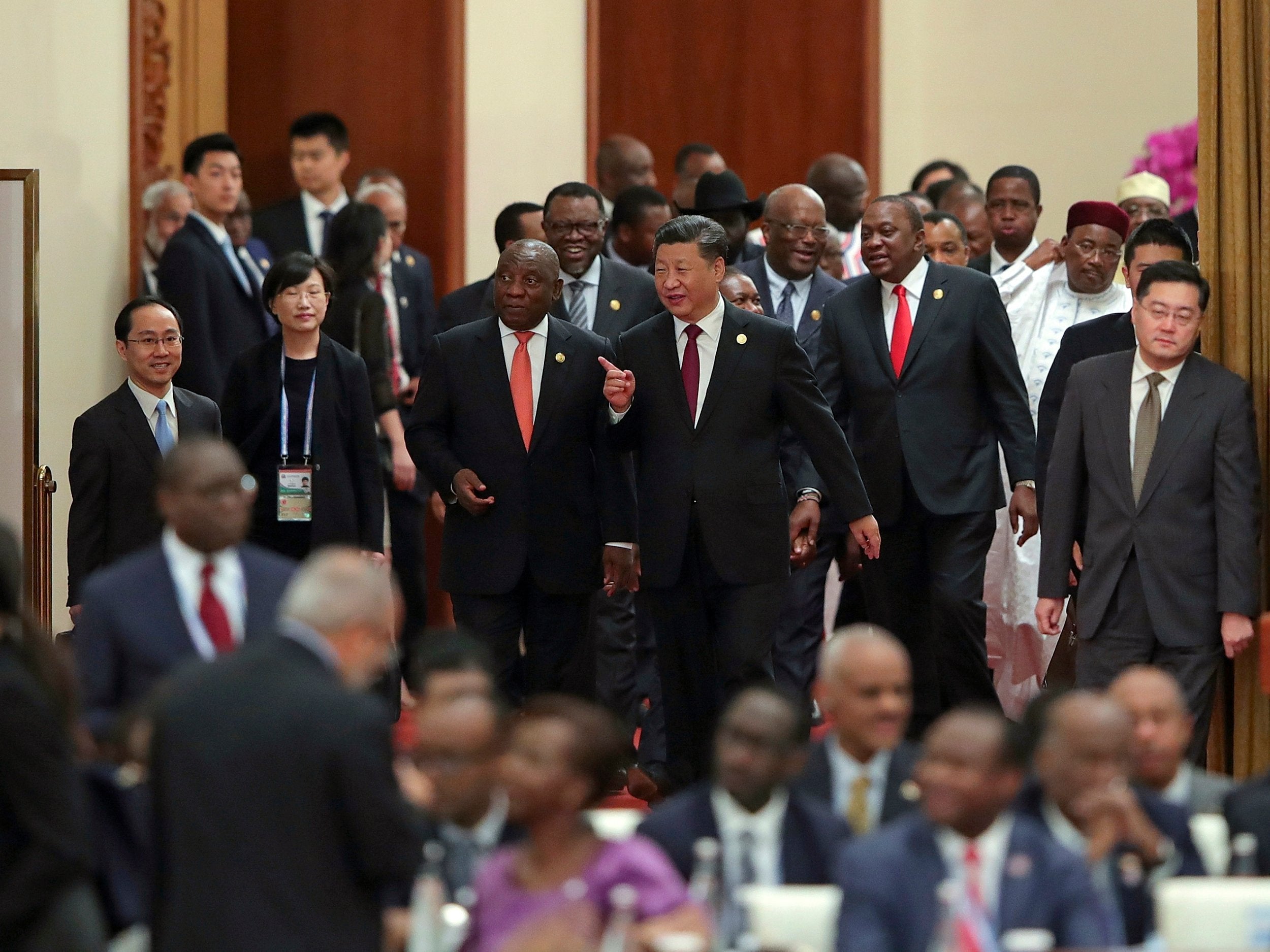African leaders leave Beijing forum hailing ‘new world order’ as China offers $60bn investment
China's Xi Jinping says investment comes with 'no political strings attached'

Your support helps us to tell the story
From reproductive rights to climate change to Big Tech, The Independent is on the ground when the story is developing. Whether it's investigating the financials of Elon Musk's pro-Trump PAC or producing our latest documentary, 'The A Word', which shines a light on the American women fighting for reproductive rights, we know how important it is to parse out the facts from the messaging.
At such a critical moment in US history, we need reporters on the ground. Your donation allows us to keep sending journalists to speak to both sides of the story.
The Independent is trusted by Americans across the entire political spectrum. And unlike many other quality news outlets, we choose not to lock Americans out of our reporting and analysis with paywalls. We believe quality journalism should be available to everyone, paid for by those who can afford it.
Your support makes all the difference.Representatives from almost every country in Africa dined with Xi Jinping on Monday night as they attended what is believed to be the largest gathering of African heads of state ever staged outside the continent.
They had plenty to toast, after China’s President Xi pledged new infrastructure investments in their countries of $60bn (£46bn) spanning the next three years.
The latest investment is in addition to the $60bn pledged back in 2015, and promises to continue the remarkable growth of China-backed building projects across the African segment, known as the Belt and Road Initiative.
China now far outstrips the economic clout and engagement in Africa of either the US or Europe, and its involvement has inevitably sparked criticism.
Malaysia’s prime minister, Mahathir Mohamad, warned against what he called a “new version of colonialism” last month when he cancelled a $20bn Chinese-backed rail project.
And in his speech addressing leaders at Beijing’s Great Hall of the People, Mr Xi appeared to acknowledge these concerns, saying Chinese investment came with “no political strings attached”.
“China does not interfere in Africa’s internal affairs and does not impose its own will on Africa,” he said. “More than 1.3 billion Chinese people and more than 1.2 million African people have always pursued a shared future.
“We respect Africa, love Africa and support Africa.”
Since Mr Xi’s announcement, African heads of state have similarly sought to play down any suggestion that China’s interests are in anything other than mutual economic growth.
Zimbabwe’s newly elected president, Emmerson Mnangagwa, hit out at critics of China in an interview on state TV.
“There is now a transition to a new world order and those who don’t see it are blind,” he said.
Cyril Ramaphosa, South Africa’s president, said the Forum on China–Africa Cooperation (FOCAC) in Beijing was working towards “a vision that has been crafted in Africa, by Africans… of an integrated, prosperous and peaceful Africa”.
“FOCAC refutes the view that a new colonialism is taking hold in Africa, as our detractors would have us believe,” he added.
Rwanda’s Paul Kagame, the current African Union chairman and a fierce critic in the past of foreign aid, said he considered China to be a “more respectful partner” than either Europe or America.
“The relationship between Africa and China is based on equality, mutual respect and a commitment to a shared well-being,” he said. “Our growing ties with China do not come at anyone’s expense.”
Some experts are not so sure. The International Monetary Fund warned in April that at least 40 per cent of low-income countries in Africa are either in debt distress or at high risk. Since the last FOCAC forum in South Africa in 2015, a number of countries have attempted to restructure their debt.
But Chinese officials have previously denied taking part in so-called “debt trap” diplomacy, and on Monday Mr Xi said government debt from China’s interest free loans due by the end of 2018 will be written off for indebted poor African countries.
“Unilateralism and protectionism are on the rise,” Mr Xi warned, an apparent reference to an ongoing trade war between his country and Donald Trump’s America.
“China-Africa cooperation under the BRI (Belt and Road Initiative) is a way to common prosperity that brings benefits to both our peoples.”
The only African country not represented in Beijing at the summit, which continued on Tuesday with meetings between business leaders and entrepreneurs, was newly-renamed eSwatini, formerly Swaziland.
That’s because it is now the only nation left in Africa still conducting diplomatic relations with Taiwan, the self-ruled territory claimed by China. Beijing refuses to do business with any country that maintains ties to Taipei – business which the rest of the African continent has decided it cannot afford to lose.
Join our commenting forum
Join thought-provoking conversations, follow other Independent readers and see their replies
Comments